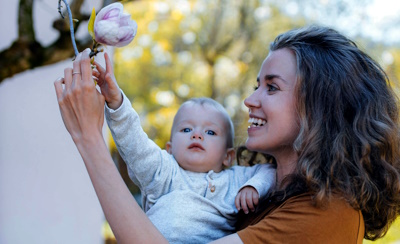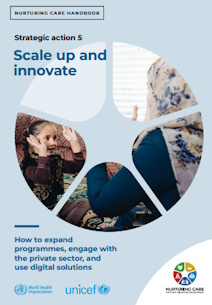This strategic action is about taking a project from a small-scale test site or pilot, and expanding it to offer more services, reach more people, or cover a larger area. That includes putting in the place the ingredients to support the expansion of programmes, including through engagement with the private sector and digital solutions.
Refer to the Nurturing Care Handbook for examples of tools and resources that can support scaling interventions, engaging with the private sector and designing digital solutions
Feasibility and impact study
An open-label cluster-randomised controlled trial was conducted to assess the feasibility and impact of an intervention to promote responsive caregiving integrated in routine primary health services. More.
From pilot to scale up: The Aarambh model (‘the beginning’)
Using a participatory process, the Aarambh (The Beginning) model engages frontline workers to deliver an adapted version of Care for Child Development in Maharashtra. The scaled-up model will engage 167,000 frontline workers and 7000 supervisors to cover a population of approximately 125 million. More.
Place-based community approach for nurturing care scaled up
Smart Start in Siaya County was one of Africa’s first initiatives to take a whole-of-government and place-based approach to improving ECD. With improved data and legislation, the model has been expanded to six more counties and integrated into five-year plans. More.
Qualitative implementation evaluation: Promoting ECD within health systems
This qualitative implementation evaluation assessed the delivery, acceptability, perceived changes, and barriers and facilitators associated with a pilot strategy that integrated developmental monitoring, nutritional screening, and early learning and nutrition counselling into the existing health facility– and community-based services for young children in rural Mozambique. More.
Mobile creches: An non-governmental organization
Mobile Creches has a hybrid business model, using both employers’ contributions (mandated by law) and grant funding. It provides activities and interventions for children from birth to the age of 6, supporting their holistic development. More.
Kidogo: A for-profit social enterpriseKidogo trains female entrepreneurs (it calls them “mamapreneurs”) and supports them in starting or expanding their own micro-businesses offering childcare in their local communities. More.
A regulatory framework for family-friendly policies
The regulatory framework for family-friendly policies requires that all employers with more than 50 employees (regardless of their gender) offer childcare facilities for children under 2 while their parents work.
The business case for employer-supported childcare
A study of tea planation workers, who are mostly women, found that employer-supported childcare provided a return on investment of 20.71% and is critical for recruitment and productivity. Mothers spoke of improved health wellbeing among their children, access to freshly cooked food and a balanced diet, and regular visits from health care workers. A toolkit was developed to help employers set up ECD services. More.
Europe and Central Asia
Evidence-based apps reach caregivers on a large scale
Bebbo, launched by UNICEF in 2021, is a free parenting support app that provides caregivers with expert advice on a range of child health and development issues, from nutrition and breastfeeding to early learning and the value of play, responsive parenting, protection and safety. Available in 14 languages, the app has reached over 300 000 users. More.
Global
Parenting for Lifelong Health (PLH)
PLH provides open-source and evidence-based parenting resources in multiple digital formats including social media, radio, PSAs, videos, among others. The resources support parents and caregivers to build positive parent-child relationships and reduce violence against children by learning through play, reinforcing positive and managing difficult behaviours, creating structure and routines, talking about COVID-19, keeping children safe online, and reducing stress and conflict. More.
RapidPro
RapidPro is an open source software solution that enables users to easily design, pilot, and scale messaging services that connect directly with a mobile phone user. Produced by UNICEF’s global Innovations Labs in collaboration with Nyuruka, a Rwandan software development firm, and drawing on eight years of experience with SMS-based applications, RapidPro is already being used in over eighty countries. Examples include health platforms to boost immunization in Indonesia, antenatal support for mothers in Cameroon, and the creation of a database to enable the early identification of and support to families with children with developmental delays and disabilities. More.
MomConnect
MomConnect is a South African National Department of Health initiative which aims to support maternal health through the use of cell phone-based technologies integrated into maternal and child health services. The services are free to the user, and messages are available in all 11 official languages. MomConnect is voluntary and the pregnant woman can opt out at any time. More.
Baby Buddy App
The Baby Buddy app is a free to download app that provides information throughout pregnancy and the first six months postnatally in the United Kingdom. It includes extensive information using different modalities including videos. All the information provided is evidence based. The app also includes daily information for expectant and new fathers, personal care and support plans as well as digital child health records. More.
Jamii ni Afya
D-tree has been working with the health ministry since 2011 to improve community maternal and neonatal care. Its mobile app – Jamii ni Afya (“Safer Deliveries”) – is used by community health workers (CHWs) in Zanzibar during home visits. It enables CHWs to create personalized birth plans, identify danger signs and refer women and families to health facilities. Managers use its data to improve services and the app itself. As a result, facility delivery rates are up 50%, and postpartum follow-up has increased fourfold. More.
Mobile technology tracking system
Called Mobile Integrated Early Childhood Development (MIECD), this tracking system uses artificial intelligence to enable data collection in real time that can then be used to guide decision-making and support to families. More.







